In today’s fast-paced digital world, the buyer journey has bring a lot of probabilities of touchpoints and interactions. With consumers engaging through multiple devices and channels, it can be challenging for brands to keep up with customer behavior and preferences.
This is where customer data platforms (CDPs) come in. CDPs integrate and consolidate customer data from various touchpoints, providing businesses with valuable insights into consumer behavior. By utilizing a CDP, brands can gain a unified view of their customers and craft targeted marketing campaigns more effectively.
In this article, we will explore the 14 best customer data platforms for 2024. Each platform offers unique features, and pros and cons to help you make an informed decision.
Contents
13+ Best Customer Data Platforms for Effective Marketing Campaigns
1. NotifyVisitors

NotifyVisitors is the best customer data platform (CDP) that helps businesses unify their customer data from multiple sources and create a single, unified view of each customer.
Our platform enables businesses to better understand their customers and deliver more personalized and relevant experiences. NotifyVisitors CDP offers a variety of features, including:
- Unified customer view: Our CDP unifies customer data from all sources, including websites, mobile apps, CRM systems, and marketing automation platforms. This gives businesses a single, unified view of each customer, including their demographics, behaviors, and interactions with the brand.
- Segmentation: We allow businesses to segment their customers based on a variety of criteria, including demographics, behaviors, and interests. This enables businesses to target their marketing campaigns more effectively and deliver more relevant messages to their customers.
- Journey builder: Our platform includes a journey builder tool that allows businesses to create and automate customer journeys. This enables businesses to deliver personalized experiences to their customers at each stage of the customer lifecycle.
- Funnel analysis: Our customer data platform offers funnel analysis tools that help businesses track the movement of customers through their sales and marketing funnels. This enables businesses to identify and address any areas where customers are dropping off.
- AI-powered features: Leverage AI to power features such as personalized product recommendations, churn prediction, and best channel and send time optimization
- Real-time data ingestion and processing: It ingests and processes customer data in real time, giving businesses the ability to make decisions based on the most up-to-date data.
- Identity resolution: We allow you to resolve customer identities across all channels, giving businesses a complete view of each customer.
- Predictive analytics: Our platform offers predictive analytics tools that help businesses predict customer behavior and identify potential opportunities.
Pros
- Seamless integration
- Comprehensive data collection
- Powerful segmentation
- Personalized messaging
- Automated workflows
- Scalability
2. BlueConic

BlueConic is a pure-play CDP that consolidates customer data from disparate systems into a central database. This allows businesses to have a 360-degree view of their existing and prospective customers.
The platform enables detailed customer profiling, leading to more accurate segmentation and enhanced customer engagement.
BlueConic’s user-friendly interface makes it easy to deploy website overlays and customized email campaigns. However, some users have reported glitchy integrations and Limited analytics and reporting capabilities.
Pros
- Scalability
- Flexible data tools
- Regular platform updates
Cons
- Some integrations are glitchy
- Limited analytics and reporting
3. Lytics
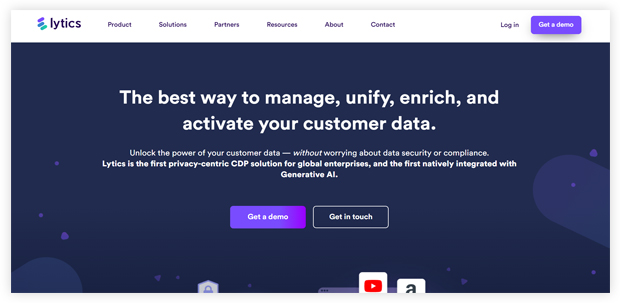
Lytics harnesses machine learning and data science to enable data teams and marketers to streamline campaigns across various channels.
The platform provides a holistic customer view and generates data-driven insights for campaign optimization.
Lytics offers intuitive tools for client activation, audience segmentation, and web personalization. However, users have reported limited customization options and complex integration with other apps.
Pros
- Easy audience segmentation
- Excellent behavioral scoring methodology
- Great targeting
Cons
- Limited customization
- Complex integration with other apps
4. ActionIQ

ActionIQ CDP is designed to solve chronic customer data fragmentation challenges. The platform enables access to real-time data at every touchpoint of omnichannel marketing initiatives.
It aligns people, technology, and processes to enhance personalization throughout the buyer journey. ActionIQ offers intuitive journey mapping and a wide breadth of functionality. However, users have reported a bulky flight process and limited reporting capabilities.
Pros
- Intuitive journey mapping
- Wide breadth of functionality
- Excellent support team and customer service
Cons
- Bulky flight process
- Limited reporting
5. Bloomreach Engagement
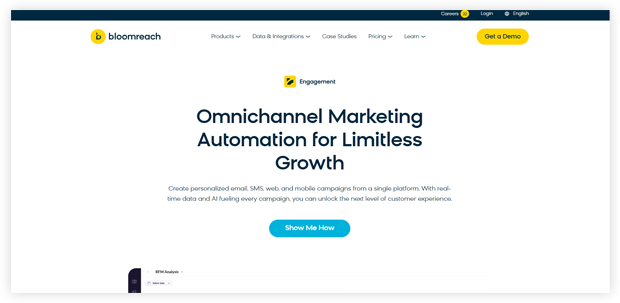
Bloomreach Engagement CDXP offers a comprehensive solution for unifying customer data and enhancing the customer experience.
The platform allows businesses to collect, store, and secure their own data, enabling extensive analytics capabilities and deep customer insights.
Bloomreach Engagement enables better customer understanding and more effective segmentation for various campaign scenarios.
However, users have reported that the platform lacks automatic dashboards for surveys and has a complex web layer setup process.
Pros
- Execution of campaigns across multiple channels
- Product personalization based on real-time customer behavior
- Easy to use
Cons
- No automatic dashboards for surveys
- Complex web layers
- Steep learning curve
6. Treasure Data
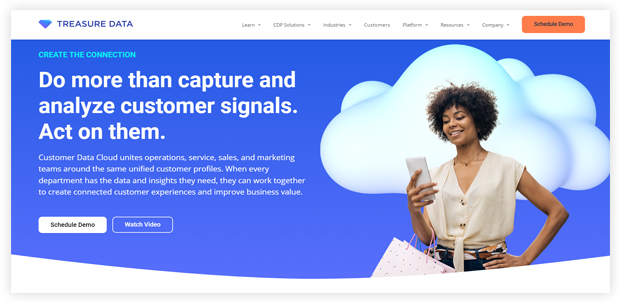
Treasure Data is an enterprise CDP that unifies sales, marketing, and service data. It offers powerful database tools and can handle massive data volumes, allowing for better segmentation and accurate analytics.
The platform has high uptime and fast response times, making it suitable for high-volume sites with multiple data sources. However, some users have reported a lack of flexibility and a slow graphical user interface.
Pros
- Data aggregation and processing time
- Predictive and actionable insights
- Seamless integrations
Cons
- Lack of flexibility
- Slow graphical user interface
7. Segment.com

Segment.com provides the data foundation businesses need to become customer-centric brands. The platform allows businesses to collect, consolidate, and use customer data from various touchpoints to make real-time decisions that enhance customer experiences.
With Segment, marketers get a single view of customers, product development teams gain insights into customer needs, and engineering teams can integrate tools across any platform.
However, the onboarding process can be confusing, and accurate results require insertion of code snippets.
Pros
- Easy integration with existing CRM
- Real-time data integration
- Standardization of data via a shared data dictionary
Cons
- Confusing onboarding process
- Requires insertion of code snippets for accurate results
8. Tealium AudienceStream CDP
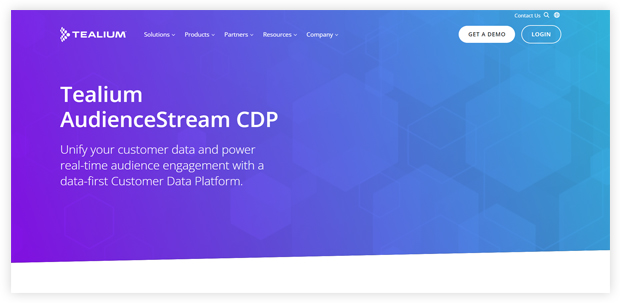
Tealium AudienceStream enables businesses to understand and engage customers in real time. The platform not only unifies customer data but also provides real-time analytics for optimized audience engagement.
Tealium AudienceStream is powered by machine learning technology and comprehensive tools that can be easily deployed across mid to large enterprises.
It offers a wide range of connectors, but some users have found the learning curve slightly steep and the user interface intimidating.
Pros
- Plethora of use cases
- Real-time data capture and management
- Wide range of connectors
Cons
- Slightly steep learning curve
- Intimidating user interface
- Concurrent user support can be improved
9. Amperity

Amperity’s AI-powered platform provides a 360-view of customer profiles, a unified hub for data intelligence, and AI-driven ID resolution and management. It helps businesses connect, identify, and understand their customers, leading to improved marketing performance.
Amperity offers easy-to-use audience segmentation and excellent predictive analytics. However, the interface can be complicated, and there are limitations in campaign reporting.
Pros
- Easy-to-use audience segmentation
- Excellent predictive analytics
- Unlocks insights instantly
Cons
- Complicated interface
- Limited campaign reporting
10. mParticle

mParticle is a simple yet powerful CDP that allows businesses to deliver exceptional customer experiences. The platform offers easy integration with existing CRM systems and real-time data integration across multiple touchpoints.
mParticle is useful for creating product roadmaps, logging customer journeys, and devising marketing campaigns.
It provides great user interface design and fast, reliable data connections. However, the cost can be relatively high, and editing existing data connections is limited.
Pros
- Data connections are easy to set up on social media platforms
- Great user interface design
- Fast and reliable
Cons
- Relatively high cost
- Unable to edit existing data connections
11. FirstHive
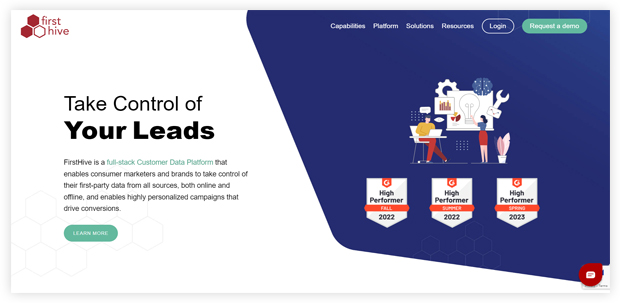
FirstHive is one of the first CDPs to utilize machine learning algorithms for building unified customer identities. The platform allows businesses to manage customer data while maintaining compliance with privacy regulations.
FirstHive’s deep learning capabilities gather data from unstructured sources and generate insights from predictive analytics. The platform offers an intuitive graphical user interface and efficient campaign execution.
However, modifying existing campaigns can be tricky, and there is a relatively high learning curve.
Pros
- Intuitive graphical user interface
- Efficient campaign execution and support team
- GDPR and CCPA compliant
Cons
- Tricky to modify an existing campaign
- Relatively high learning curve
12. SALESmanago

SALESmanago sets itself apart with its no-code AI-driven platform. It combines customer data management, customer experience optimization, and marketing automation in one agile platform.
SALESmanago enables hyper-personalized customer experiences in multiple channels, leveraging AI, big data analytics, and machine learning.
The platform offers comprehensive tools for email and social media marketing, lead management, campaign management, and reporting. However, customization options are limited, and there are few third-party integrations.
Pros
- Comprehensive tool stack
- Convenient drag-and-drop functionality
- Flexible price tiers
Cons
- Lean customization options
- Limited third-party integrations
13. Hull
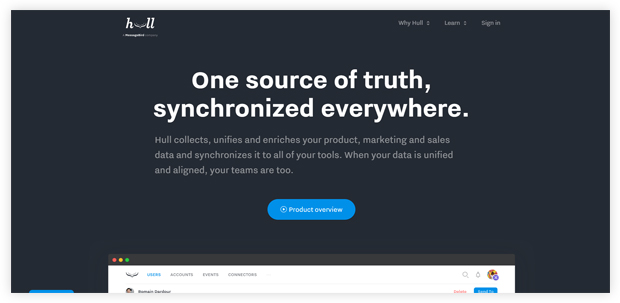
Hull CDP consolidates customer data to keep all customer-facing teams in sync. It eliminates time-consuming API integrations and disparate tools, enabling real-time data synchronization.
Hull integrates marketing data, customer support information, and CRM data into one user profile for consistent representation at any point in the customer journey.
Hull offers deep, native integrations and excellent customer support. However, users have reported occasional downtimes and fewer available integrations.
Pros
- Deep, native integrations
- Real-time data synchronization
- Excellent customer support and service
Cons
- Frequent downtimes
- Fewer available integrations
14. Totango

Totango enables businesses to boost customer engagement throughout the buyer journey. The platform offers real-time access to customer data, allowing proactive ways in nurturing customers at each touchpoint.
Totango is useful for startups and scaleups because of its flexibility and scalability. It integrates with existing tools and offers a single dashboard for managing all aspects of customer engagement.
However, there are limitations in UI customization, and the platform may require some training.
Pros
- Customer health score tracking and analysis
- Strong customer segmentation
- Data visualization and trends
Cons
- Limited UI customization
- May require soe training
- Pages tend to load slow
15. Experro

Experro is an innovative Customer Data Platform (CDP) designed specifically for eCommerce businesses. It empowers brands to deliver hyper-personalized experiences and drive impactful marketing campaigns by unifying customer data from various touchpoints.
Key Features:
- Unified Customer Data: Experro aggregates data from websites, mobile apps, and CRM tools, creating a 360-degree view of each customer.
- AI-Powered Personalization: Leverage AI for dynamic product recommendations, churn prediction, and predictive analytics.
- Segmentation and Targeting: Advanced segmentation tools enable businesses to create highly targeted and relevant marketing campaigns.
- Real-Time Analytics: Process customer data in real-time for actionable insights and quick decision-making.
- Omnichannel Marketing: Deliver consistent customer experiences across web, mobile, and other channels.
Benefits:
- Scalable for businesses of all sizes.
- Easy integration with existing systems.
- User-friendly interface for seamless operations.
- Robust analytics for data-driven decisions.
Why Choose Experro?
Experro sets itself apart with its focus on eCommerce, offering tailored solutions that enhance customer journeys and maximize ROI. Its comprehensive suite of tools ensures businesses stay ahead in today’s competitive digital landscape.
Conclusion
Customer data platforms play a crucial role in helping businesses gain valuable insights into consumer behavior and preferences.
Some of the best customer data platforms for 2024 provide various features and benefits, allowing businesses to unify customer data, enhance customer engagement, and craft targeted marketing campaigns more effectively.
By carefully evaluating the pros and cons of each platform, businesses can choose the best customer data platform that aligns with their goals and requirements.
FAQs
1. What is a customer data platform?
CDPs integrate and consolidate customer data from various touchpoints, providing businesses with valuable insights into consumer behavior. By utilizing a CDP, brands can gain a unified view of their customers and craft targeted marketing campaigns more effectively.
2. What is the value of CDP in a business?
CDP offers extensive insights on customer behaviour, preferences and requirement of targeted audience. It offers valuable data that help you build effective campaign.
3. What are the best CDPs options for my business?
1. NotifyVisitors
2. Clevertap
3. Moengage
4. Segment.com
5. Amperity

























 Email
Email SMS
SMS Whatsapp
Whatsapp Web Push
Web Push App Push
App Push Popups
Popups Channel A/B Testing
Channel A/B Testing  Control groups Analysis
Control groups Analysis Frequency Capping
Frequency Capping Funnel Analysis
Funnel Analysis Cohort Analysis
Cohort Analysis RFM Analysis
RFM Analysis Signup Forms
Signup Forms Surveys
Surveys NPS
NPS Landing pages personalization
Landing pages personalization  Website A/B Testing
Website A/B Testing  PWA/TWA
PWA/TWA Heatmaps
Heatmaps Session Recording
Session Recording Wix
Wix Shopify
Shopify Magento
Magento Woocommerce
Woocommerce eCommerce D2C
eCommerce D2C  Mutual Funds
Mutual Funds Insurance
Insurance Lending
Lending  Recipes
Recipes  Product Updates
Product Updates App Marketplace
App Marketplace Academy
Academy

